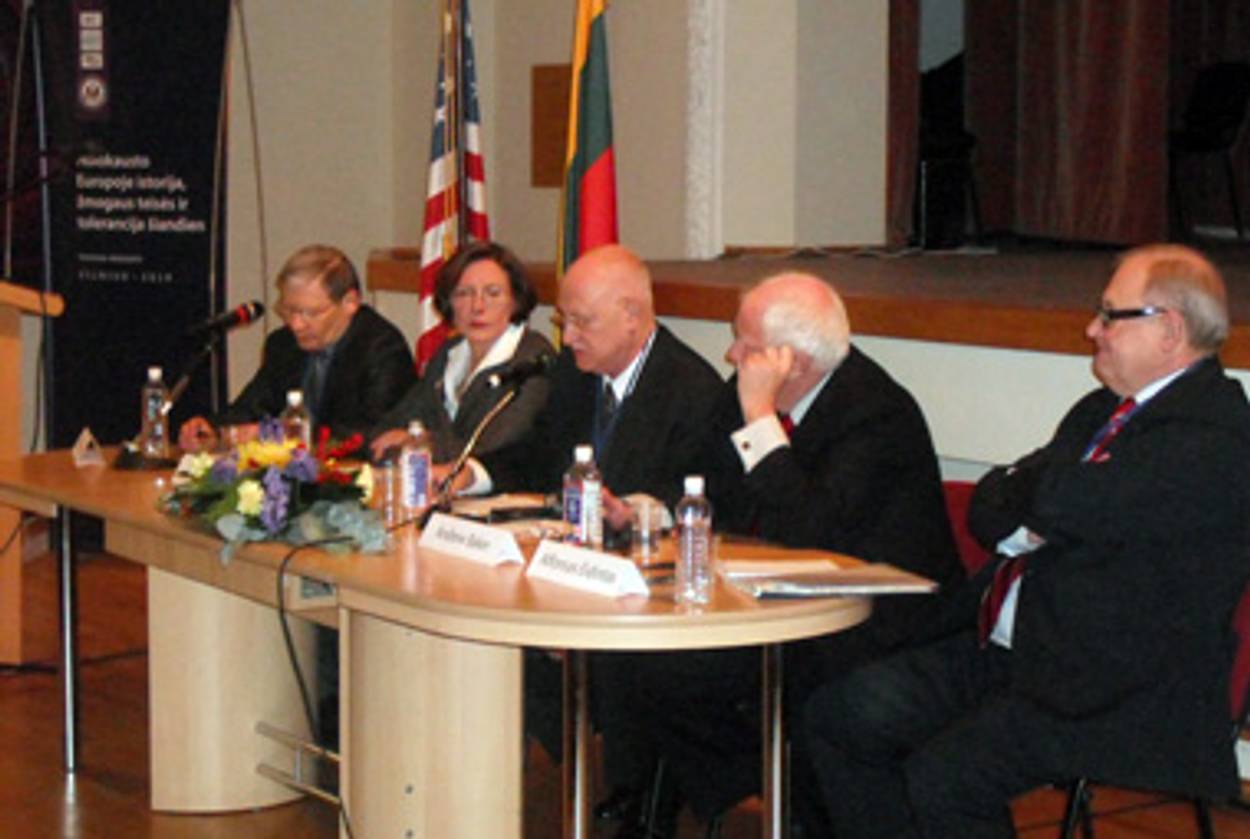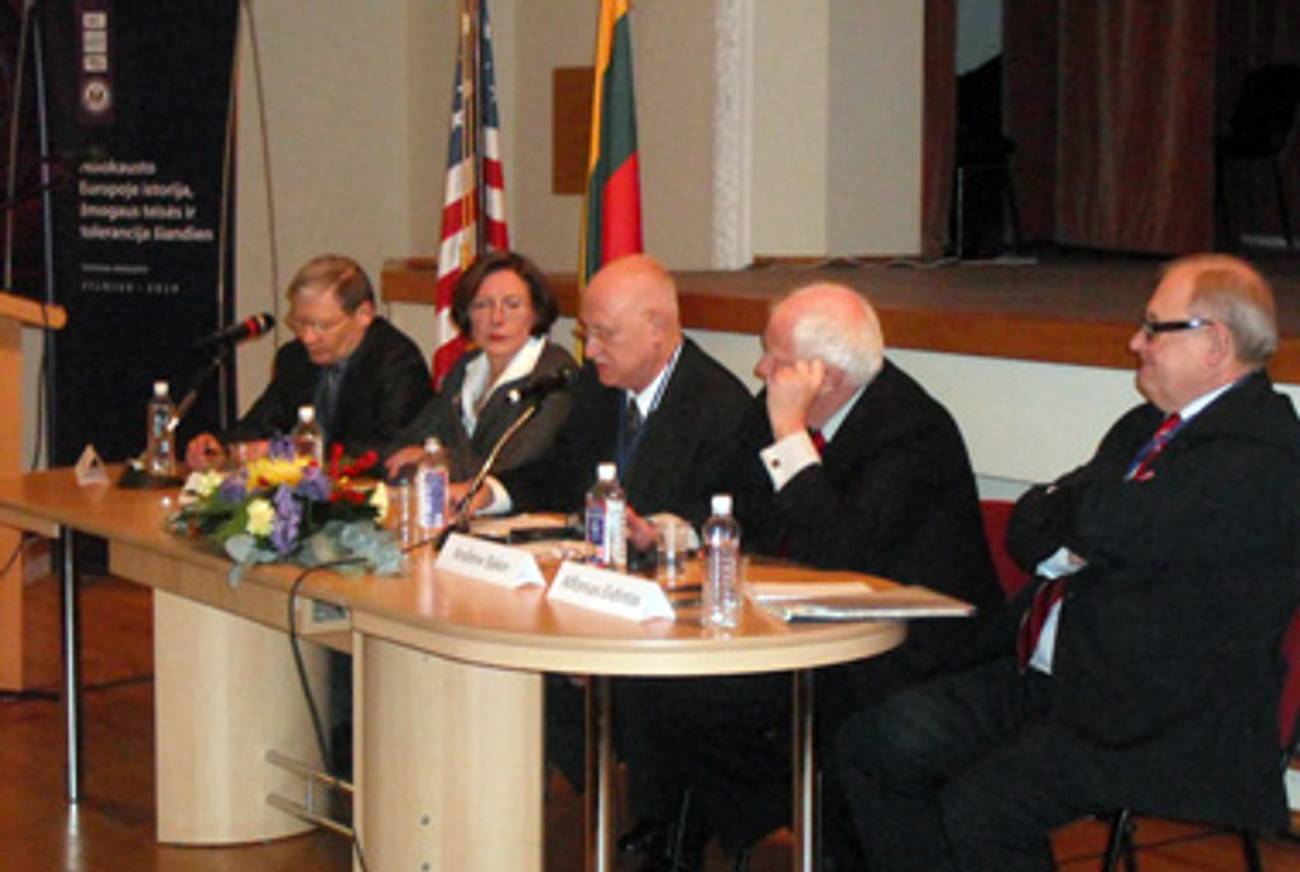Conference Call
The Lithuanian sponsors of a Holocaust education program have a dark history of their own




Today is the fifth and last day of an event in the Lithuanian capital that few would have thought likely: an international conference on Holocaust education whose prime local partners are two state-sponsored bodies that specialize in downgrading the Holocaust into “one of two equal genocides”—a phenomenon I wrote about for Tablet magazine last May. The Genocide Research Center runs a Genocide Museum that doesn’t mention the word Holocaust and that features 1950s anti-Semitic exhibits without curatorial comment. The second, a state-financed commission on Nazi and Soviet crimes, published some good research but lost credibility when Yitzchak Arad, the Holocaust survivor-scholar it had recruited precisely for credibility purposes, was himself accused of “war crimes” in 2006—for having escaped the ghetto to join the anti-Nazi resistance. The commission didn’t have a public word to say about that, or about the subsequent “war crimes investigations,” widely regarded as kangaroo, started in 2008 (and still not closed) against two Jewish heroines of the anti-Nazi resistance. And so, this week’s conference might be considered a horrible joke at best; at worst, it is a grim circus of historical manipulation.
The event, called “Training teacher-trainers: European Holocaust History, Human Rights, and Tolerance Today,” featured just one session open to the public, held on Monday morning. The speakers at the opening session were U.S. Ambassador Anne E. Derse; State Jewish Museum (Tolerance Center) head Markas Zingeris; diplomat-historian Alfonsas Eidintas; and two senior Jewish-American dignitaries, AJC director of international relations Andrew Baker, and Washington Holocaust Museum outreach director Stephen Feinberg. The controversial right-wing Jewish MP Emanuelis Zingeris, himself a signatory of the Prague Declaration, made a characteristically dramatic entry halfway through and spoke briefly. Finally, a vice-director of the museum invited the assembled to coffee and politely reminded everyone that the following sessions were closed to all but invited participants.
None of the speakers made any acknowledgment to the silently seated leaders of the Jewish community, who were not asked by the organizers to say a word of greeting. And not one of the speeches managed to mention the essential facts of the sobering history: The Baltics had the highest percentage of Jewish deaths in Holocaust-era Europe—around 95 percent—because of the massive local collaboration, which in this part of the world entailed serving in many cases as the actual murderers. Nor did they mention that during 2010, a Lithuanian court legalized public swastikas. That the permit for a neo-Nazi parade was taken out by a member of parliament. That the foreign minister claimed a foreign Jewish plot is behind new dual-citizenship proposals. That zero progress is made on enabling the safe return of 89-year-old Holocaust survivor Rachel Margolis, one of the Jewish partisan veterans under special prosecutors’ sham investigation. It was as if a grand new field of “Lithuanian Holocaust Studies” could gain international acceptance while shirking each and every one of the painful issues with impunity.
Conspicuously absent at the conference were the foreign ambassadors in town, from Britain, Estonia, Finland, France, Netherlands, Norway, and Sweden. NATO envoys for these seven countries here last week sent a formal letter (organized by the British embassy, rumor has it) to Lithuanian authorities protesting the recent Holocaust denial in the press by an Interior Ministry specialist (who has since resigned). The letter also made bold reference to the broader issue: “Spurious attempts are made to equate the uniquely evil genocide of the Jews with Soviet crimes against Lithuania, which, though great in magnitude, cannot be regarded as equivalent in either their intention or result.” The Polish ambassador added his own eloquent letter.
And from the United States? Utter, painful silence.
***
In the diplomatic community here, the codeword for this saga is “The $64,000 Question” (even though the operative currency is the euro). Back in April, Hannah Rosenthal, the United States Special Envoy to Monitor and Combat Anti-Semitism, announced during a trip to Lithuania that “the U.S. Embassy in Vilnius has received a 63,572 Euro grant for International Holocaust Education, Remembrance, and Research to develop a Holocaust education program with the Lithuanian Ministry of Education and other partners.” As the sum is identical to one applied for by the U.S. embassy from the International Task Force for International Cooperation on Holocaust Education, Remembrance and Research, it is assumed that the ITF is the source of the funding.
An October query from DefendingHistory.com to the American embassy elicited an Orwellian response from a senior embassy official: “Disbursement information about USG public diplomacy grants is not public” [italics mine]. Then, on November 21, the Tel Aviv-based Association of Lithuanian Jews, the world’s most active association of Holocaust survivors from Lithuania, released to the media its letter to the U.S. ambassador, which included the warning that “it would be a huge and painful blow to Holocaust Survivors, and to the memory of the victims, if even one single euro were granted to those engaged in pursuing and promoting this antisemitic revisionism under the guise of local Holocaust education.” The letter went on to ask the embassy to release “all details of disbursement of this grant without further delay to clear the air.”
On the day of the conference opening, Efraim Zuroff, director of the Simon Wiesenthal Center’s Israel office, which focuses on bringing war criminals to justice, preventing their posthumous rehabilitation, and on defending the historical narrative of the Holocaust, wrote in the Guardian: “For Washington to ignore a blatant distortion of the historical events of the Second World War only emboldens those invested in outright denial of the Holocaust.” While the U.S. Embassy in Vilnius, the United State Holocaust Memorial Museum, or the American Jewish Committee could have been expected to stand firm against the historical record being revised by the right-wing leadership of the Baltic states, and with the Holocaust Survivor community to which it has been loyal in the past, it is hard to ignore the frightening possibility that they have all, on this particular occasion, been duped. By whom? A highly polished state-sponsored effort to win Western and foreign Jewish acquiescence to the obfuscation of the Holocaust and the legitimization of that obfuscation, in history and education alike. All that’s needed is for a handful of foreign dignitaries and the American Embassy to be bamboozled once, and that alleged conceptual support will be cited until the end of days.
***
It is not too late to turn this frightful fiasco into an inspirational success. On the last day of the conference, and with future events planned under the same grant, some bold welcome correctives can be enacted. Here are six for starters:
1. Invite a group of Holocaust Survivors―including Rachel Margolis―to sit in the front row, and invite them to meet at length with the educators being trained.
2. Tackle today’s hard issues up front—including the Prague Declaration, the ongoing Lithuanian investigations against Holocaust Survivor resistance heroes, and the recent law in effect criminalizing the Western narrative of the Holocaust by threatening two years in prison for those who would deny the notion of two equal genocides—instead of sweeping them under the rug.
3. Exclude the state organizations that campaign for the “Genocide and Resistance Research Center of Lithuania” and the “International Commission for the Evaluation of the Crimes of the Nazi and Soviet Occupation Regimes in Lithuania” (the so called red-brown commission, from which Yitzhak Arad and Sir Martin Gilbert resigned on principle, leaving it with no credibility in serious Holocaust studies circles).
4. Give the Jewish community of today’s Lithuania a primary role in Holocaust education. Have these educators meet real living Jews of various generations. Enable, most urgently, the fine young educators attending the conference to get to know prewar Lithuanian Jews at the last moment in history when this is possible, thereby fostering the inter-community harmony and understanding that comes from genuine dialogue.
5. Use grant funds to bring to Lithuania ample copies of essential books in English on the Lithuanian Holocaust. Virtually all the history teachers in question read English, and there is no reason why they should not have access to the same materials that their counterparts in the West use to study this subject. Among these for Lithuania would be Yitzhak Arad’s The Holocaust in the Soviet Union, Karen Sutton’s The Massacre of the Jews of Lithuania, Efraim Zuroff’s Operation Last Chance, and published primary sources such as Kazimierz Sakowicz’s Ponary Diary.
6. Make certain the sessions are never again closed to the public.
Dovid Katz is chief analyst at the Litvak Studies Institute and a research associate at University College London. He is the author of Lithuanian Jewish Culture and the website DefendingHistory.com.
Dovid Katz, a Vilnius-based Yiddish and Holocaust scholar, is professor at Vilnius Gediminas Technical University. He edits the web journal Defending History and is at work on a new Yiddish Cultural Dictionary.